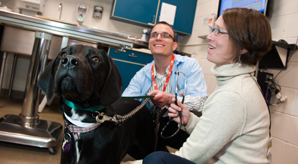

Giving your dog or puppy a balanced and appropriate diet is critical to his health, longevity, and ability to have a high-quality life.
Puppies and adult dogs require different diets. Puppies require specific balances of nutrition to benefit their bones and organs as they grow and, depending on their breed, require this special diet for as long as nine to 24 months. Older dogs may need special diets to help them maintain a healthy weight or to help them as they age.
Unless your dog needs a specific diet due to health concerns, adult dogs need a high protein food -- ideally about 20 percent of the content should be protein. Their food should be between 5 percent and 8 percent fat, and important nutrients such as manganese, lysine, phosphorus, calcium, iron and zinc, and vitamins including vitamin A, D, B12, and E. Thiamine, niacin, and folic acid also are important.
Other diet tips:
The CSU Veterinary Teaching Hospital provides comprehensive veterinary care. To make an appointment, call 970-297-500 or visit csuvets.colostate.edu